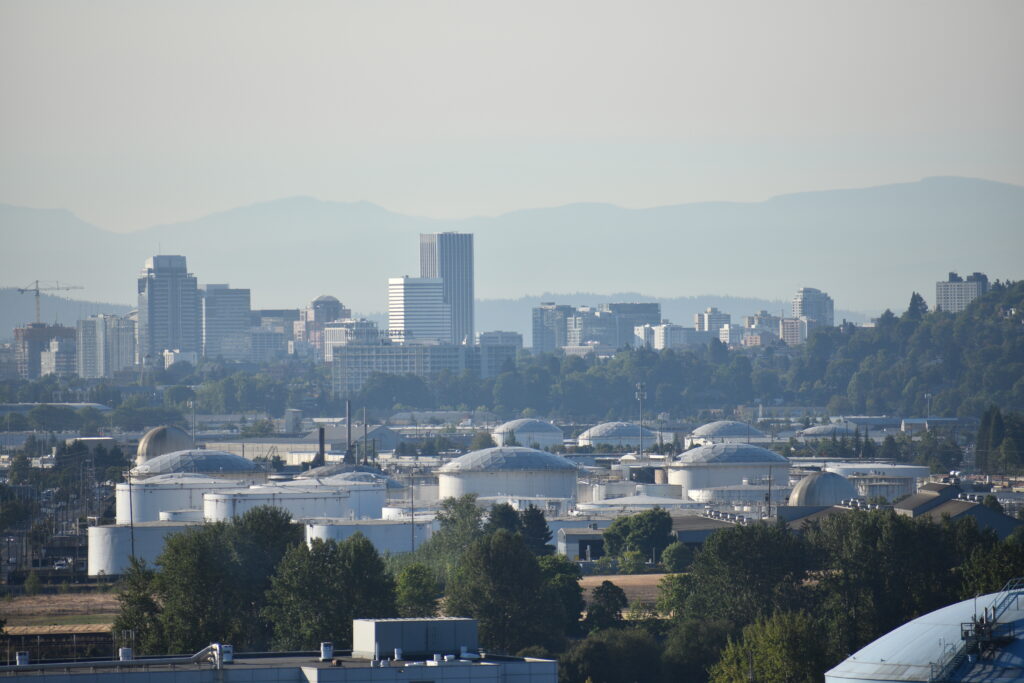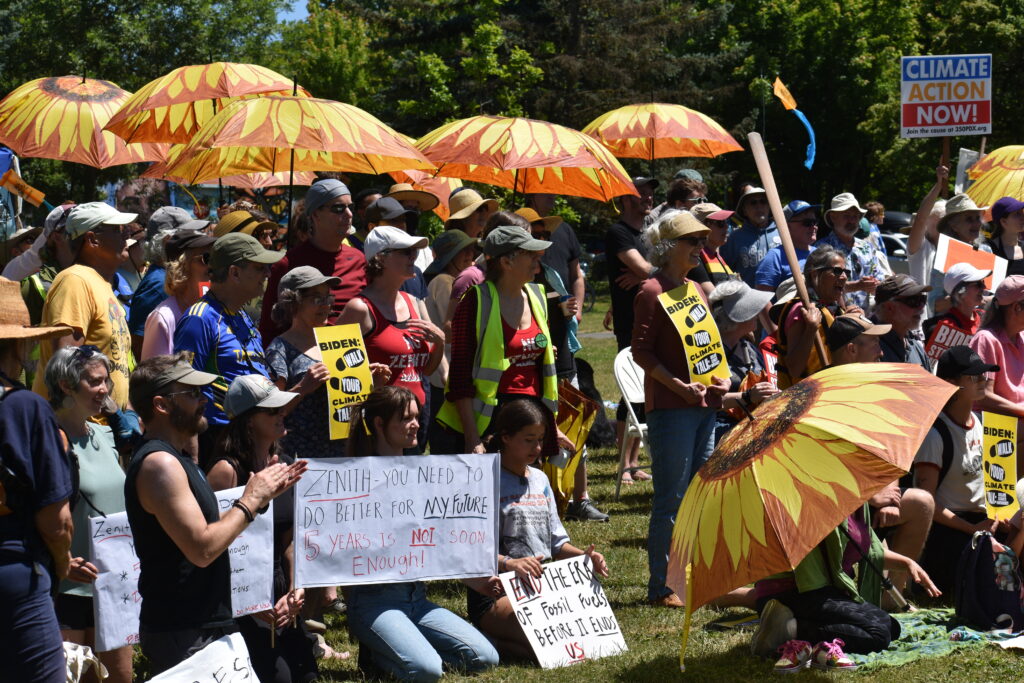In the summer of 2022, it seemed that the days of an oil-by-rail facility in Portland, Oregon, were numbered. The previous year, the city had rejected a land use permit for a company called Zenith Energy, which receives crude oil shipped by rail from as far away as North Dakota. Zenith had appealed the decision, but had already suffered a string of defeats in the state.
Climate activists and community associations, who were concerned about the risks associated with oil-by-rail shipments, counted the city’s rejection of the permit as a major victory, and were tantalizingly close to prevailing over the company. All that was left was Zenith’s last-ditch appeal to the Oregon Supreme Court. If the high court declined to hear the case, the oil-by-rail operations in Portland would be in serious jeopardy, a blow against an energy company that acts as a conduit for crude oil shipped around the entire West Coast.
But at the eleventh hour, in October 2022, the city made a surprise announcement: It had reversed course and authorized Zenith to continue to operate through the late 2020s, after which the company promised to switch to trains carrying renewable fuels.
Community and environmental groups were furious, blasting the “backroom deal.” Elected city officials who position themselves as climate champions defended the decision as a routine administrative matter, repeatedly claiming their hands were tied.
But internal email communications and documents obtained by DeSmog suggest that the process was heavily influenced by two city commissioners and their staff, who met with the oil company on multiple occasions — including at a private in-person meeting at the rail site — and seem to have helped usher the company’s land use permit through the regulatory process.
In the summer of 2022, faced with a very real opportunity to confront the fossil fuel industry, potentially forcing the facility to halt oil train shipments entirely, the city instead chose to strike a compromise that allows the oil facility to continue to operate.
“I didn’t expect it at all,” Nick Caleb, a staff attorney with Breach Collective, an Oregon-based climate justice organization, told DeSmog. “If you had told me the city is going to strike a deal with Zenith to allow at least five more years of their fossil fuel operations, I would just be like, ‘Why? You’re in the driver’s seat. Why would you give up your power and leverage?’ It doesn’t make any sense.”
“It All Happened Without Any Public Input”
Zenith Energy is a Houston-based oil company that operates storage facilities, pipelines, and rail terminals around North America and Europe. It came to Portland in 2017 when it acquired an old asphalt site on the Willamette River, using grandfathered-in permits that allowed it to quickly set up operations while avoiding extensive regulatory scrutiny.
Zenith’s oil-by-rail operations are located along a six-mile stretch of industry in Portland, known as the Critical Energy Infrastructure hub, which hosts a heavy concentration of fossil fuel infrastructure. The hub has 630 tanks storing crude oil, gasoline, and jet fuel, holding 90 percent of Oregon’s entire liquid fuel supply.
Zenith brings in crude oil on mile-long trains, loads the oil onto ships docked on the river, and then exports cargoes down the river and out to the Pacific Ocean, ultimately connecting Bakken crude from North Dakota to other markets on the West Coast. In just a short period of time, the volume of oil that has moved through Portland has soared, rising from negligible levels a few years ago to 337 million gallons in 2021. In 2022, volumes jumped again, increasing to 374 million gallons.

However, the hub is situated on seismically unstable land. In the event of a major earthquake, the soils are at risk of “liquefaction” — the ground would essentially turn to mush, and the hundreds of tanks could rupture, spill, or explode. A 2021 report from Multnomah County, where Portland is located, studied the potential impacts of a major earthquake — for which the region is overdue. It found that 397 tanks could spill their contents, releasing between 94 and 193 million gallons of fuel, or more than half of the total supply of fuel held in the industrial corridor.
That would be an environmental disaster of a magnitude with few historic parallels. The impacts would be similar to the 2010 BP/Deepwater Horizon blowout in the Gulf of Mexico, and the 2011 Fukushima nuclear meltdown in Japan, “in terms of level of releases and resulting damages to the environment, health, and safety,” the Multnomah County report concluded.
For years, city officials claimed they had little power over the facility. But that changed in 2021 when Zenith needed to renew a state air permit, a process that also required the company to first get the city of Portland to sign off on what’s called a “Land Use Compatibility Statement,” or LUCS, which is a document issued by the city that says the facility’s operations comply with local land use planning and regulations.
Portland finally had leverage over the oil-by-rail operations. Under tremendous pressure from community and environmental groups, as well as some county and state officials, the city government shot down the LUCS in August 2021, and climate groups rejoiced.
Zenith appealed the decision, but lost in several legal venues. The company’s last resort was an appeal to the state supreme court.
Even as the litigation dragged on, it appeared that Portland was in a strong position. It was winning in the courtroom, and if Zenith couldn’t get its LUCS from the city, then its state permits were also blocked, putting the whole operation in jeopardy.
But inexplicably, in early October of last year, the city quietly approved an entirely different LUCS for Zenith Energy without even informing the public that a second application was in the works.
“It all happened without any public input,” Audrey Leonard, a staff attorney with Columbia Riverkeeper, told DeSmog. Columbia Riverkeeper was formally involved in litigation defending the city’s initial rejection of Zenith’s LUCS. “It seemed like this was kept behind closed doors on purpose to just sort of have it be a done deal by the time it was public.”
Documents Indicate Influence of City Commissioners
The approval appeared to be a compromise with the company. The new agreement stipulated that Zenith could continue shipping crude oil by train through Portland for another five years, after which it needed to transition to renewable fuels. City officials tried to frame the announcement as a win for the climate, but climate groups were incensed. At the time, Caleb, the climate attorney, called it “wildly irresponsible.”
Portland’s form of government, unusual among other large cities, assigns the responsibility of overseeing municipal agencies to individual city commissioners. The commissioners appoint directors of the bureaus, but largely stay out of day-to-day operations. The Bureau of Development Services (BDS) is the agency that was tasked with regulating Zenith and approving the LUCS.
At the time when BDS approved Zenith’s permit, the bureau was overseen by City Commissioner Dan Ryan, with the portfolio passed to City Commissioner Carmen Rubio at the start of 2023. Both commissioners assert that the approval of the LUCS was a routine matter for the bureau, not a decision made by elected officials.
“We don’t have the authority to rescind this. The decision was processed in the same manner as every other LUCS,” Rubio said in February 2023 at a city council meeting.
The head of BDS, Rebecca Esau, has echoed that claim. “The City completes the LUCS as an administrative matter,” Esau wrote in a letter to outraged climate groups in late 2022, pushing back on the notion that the city did anything out of the ordinary. She added that because it was merely an administrative process, there was no need to notify the public or hold a public hearing. “The City reviews all LUCS in the same manner and does not establish new processes or procedures based on individual applications.”
But new documents and email communications obtained by DeSmog show that there is more to the story. Both city commissioners Dan Ryan and Carmen Rubio, and their top staff, were not only involved in the process, but appear to have played an influential role in coordinating the effort to push Zenith’s new LUCS application over the finish line. That contradicts the public narrative that the LUCS was the result of a routine administrative process at the bureaucratic level, with elected officials above the fray.
Commissioners Visit Zenith for Private Meeting
Emails from Zenith’s lobbyists at Pac/West Communications show that Zenith’s outreach to city council began as soon as the company’s legal challenges began to run into trouble. On February 2, a state land use board ruled that Portland had the authority to reject the permit, as long as the city provided some more evidence to justify its decision. That same day, Zenith reached out to Commissioner Ryan to invite him to visit its site. That appears to be the beginning of an effort that would last several months to court Ryan and Rubio, with the goal of getting the city commissioners to visit the site. The overtures continued through the spring, including to Rubio’s office.
In several emails from June 2022, a Portland deputy city attorney says she is awaiting “direction” from Commissioner Ryan on how to proceed with Zenith, and whether the matter should be handled by BDS or the city council. At that time, Zenith’s back was against a wall. BDS had rejected Zenith’s first LUCS in 2021, and the February land use board’s decision went against Zenith as well. The company then appealed that ruling, but the Oregon Court of Appeals also dismissed its arguments. Zenith’s last hope was an appeal to the state supreme court. With Portland holding all the cards at this juncture, the city attorney was seeking guidance from Commissioner Ryan on next steps. There was no particular urgency for the city to act — all it had to do was wait and see if the Oregon Supreme Court would hear the case.
It is not clear what Ryan ultimately decided in the early summer of 2022. But a month and a half later, on July 29, both Ryan and Rubio, along with their top staff, went to Zenith’s rail terminal, where they met with Zenith personnel and Pac/West, to hear about Zenith’s “future plans,” which included “renewables,” according to a meeting agenda.
In retrospect, the meeting turned out to be pivotal. Zenith presented the two city commissioners with its vision of how it would overhaul its operations and transition to renewable fuels over time, helping Portland become a renewable fuels hub for the entire west coast.

The details of these plans were not made public. But a series of documents obtained by Breach Collective, and shared with DeSmog, offer clues into what was discussed at the rail terminal that day.
“Out in 5 yrs. Ready to immediately convert 20% of infrastructure to RD + SAF [Renewable Diesel + Sustainable Aviation Fuels],” a staffer with the Bureau of Planning and Sustainability wrote in notebook, an apparent reference to Zenith’s pitch to the city to end oil-by-rail shipments within five years and switch over to renewable fuels. Zenith also said it did not have enough infrastructure at the moment, but wanted a “partnership” with the city to make this vision a reality. The company also wanted a new LUCS in order to move forward.
The handwritten notes were the rough contours of what appeared to be a compromise offer, coming at a time when Zenith’s fossil fuel operations were in legal peril. The notes would closely resemble the specifics of the LUCS permit that the city would approve two months later. The discussions between Zenith and city commissioners occurred at a time when the company and the city were in active litigation.
“They are working hand in hand with the city and getting feedback on it, almost like a negotiation,” Leonard said, referring to Zenith’s apparent pitch at that meeting.
From there, the pace of events began to pick up momentum. Immediately after that meeting at the terminal, the commissioners and their staff broadened talks to a larger group of city personnel. On August 3, Rubio held a “follow up” meeting, which included Ryan, the deputy city attorney, and staff from the relevant bureaus overseeing Zenith’s operations.
A day later, Zenith VP Grady Reamer sent an email to Ryan and Rubio, thanking them for meeting and for discussing how Zenith’s oil-by-rail terminal “is positioned to assist Portland and the State of Oregon with a transition to low carbon energy alternatives.” He then stated that Zenith intended to apply for a new LUCS, which would help the company get “out of the fossil fuel crude oil business in five years,” mirroring what was discussed at the in-person meeting at the rail terminal. Reamer then concluded by stating that there are “a lot of things that need to fall into place for this plan to happen and we hope we can continue to have an open dialog and a shared vision to meet our mutual goals.”
Zenith’s opponents believe that the commissioners’ visit to Zenith, and the emails from the company to the commissioners, provide strong evidence to support the notion that there was some sort of agreement or understanding between the city and the oil company.
“It would be really hard to not read that some kind of assent was given by the city, and a decision made, either at the July 29 site visit or in the days that followed,” Caleb said, because by early August, “Zenith is under the impression that there are a lot of shared goals” between the city and the company, he said.
“The site visit on July 29 was one of the more concerning pieces for me,” Dineen O’Rourke, campaign manager for 350PDX, told DeSmog, after reviewing the documents. “It really shows us there was a negotiation between the city officials and Zenith taking place at the site of a major industrial polluter, which orchestrated their next LUCS approval, and it was clearly discussed at that meeting. At the very least, it is bad process to be doing something like that when there is active litigation going on.”
When asked about the July 29 site visit, a spokesperson for Commissioner Rubio said:
“Zenith scheduled the tour to share the direction the company was headed in terms of the products it stored. That direction is reflected in the Land Use Compatibility Statement submitted by Zenith, which was processed in the same manner as every other LUCS.”
Rubio’s chief of staff, Jillian Schoene, appears to have played a significant role in the city’s relationship with Zenith over the summer, having met with lobbyists hired by Zenith, Pac/West Communications, on at least two occasions, in June and July.
“Jillian’s recollection is that these meetings were to invite us to the tour and to hear from us about the policy work we were doing regarding reducing fossil fuels at the Critical Energy Infrastructure Hub,” Rubio’s spokesperson said.
But the fact that Zenith wanted to hear more information from city officials “is additional evidence that a compromise was negotiated that day or soon after,” Caleb said, referring to the July 29 meeting. It means the handwritten notebook, detailing Zenith’s vision, “doesn’t reflect the full discussion and likely omits city offerings,” he added.
When asked if the city commissioners negotiated or compromised with Zenith in the summer of 2022, the spokesperson for Rubio said: “I can only speak for Commissioner Rubio and our staff – and the answer is no.” Commissioner Ryan’s office did not respond.
“They Made a Political Choice”
In late August, Ryan participated in a waterfront tour, a day-long boat trip along the industrial corridor in Portland, meeting with a variety of companies. The eighth stop on the tour included Zenith Energy. Zenith’s Grady Reamer emailed Commissioner Ryan a few days ahead of time to say that he would be in attendance. He attached a working draft of the new LUCS application, which had not been officially submitted, and said he could answer any questions the commissioner might have about it during the tour. It is unclear whether Ryan and Reamer held discussions, but the waterfront tour was the second time in a month that members of Portland’s city council visited the terminal.
Zenith did not file the new LUCS application until September 12, but additional communications suggest the outcome may have already largely been a foregone conclusion. In late August, days before the application was officially sent to the city, Rubio’s chief of staff, Jilliane Schoene, wrote in an email: “So who tells Zenith to hold off until we give them the green light to send to us officially the new LUCS?”
When asked about this message, the spokesperson for Rubio’s office said Schoene was asking “a process question.”
But critics see that exchange as evidence that the city had already decided to approve the LUCS and was simply finessing the timing of the formal three-week BDS review process that would kick off when the application was submitted.
“This is really good supporting evidence for the argument that this decision was prejudged prior to the second LUCS being formally submitted,” Caleb said. “For me it looks like: ‘Okay, we already decided, now we just need to line up the timing for the formal review that’s going to happen, which we all know internally is going to be approved.’”

On September 14, Zenith announced that it would transition to renewable fuels and would apply for a new LUCS, the first time the public would become aware that the company was attempting to chart a path forward with a new permit. Five days later, at a time when the LUCS was technically under review, a briefing document for Commissioner Ryan from the Bureau of Development Services says that the bureau was awaiting information from Zenith, but upon receiving it, the LUCS would be issued. It goes on to refer to the pending litigation before the Supreme Court between the city and Zenith, stating: “We will request that [Zenith] withdraw the appeal upon issuance of the new LUCS.”
The apparent compromise with Zenith had occurred outside the context of settlement negotiations and before the city had received all information from the company for its application.
“There’s just all this stuff that happened after the major decisions were apparently made to support Zenith’s plans, instead of the other way around, where a regulator would look at the evidence first in the formal review and then make a decision,” Caleb said. “Instead of having that kind of objective analysis, the record strongly suggests they made a political choice.”
In late September, Commissioners Rubio and Ryan hosted a meeting to discuss “communication” related to Zenith’s soon-to-be-issued LUCS, an effort to coordinate the city’s PR, which again took place before BDS had even finished its review. A senior policy advisor for Ryan told the scheduler to leave Zenith’s name out of the subject headline in emails related to the event.
Meanwhile, after Zenith’s September 14 announcement, reporters began asking about how long the new LUCS application had been in the works. The two commissioners’ offices gave statements about how the application was under review, without answering when the process started. In one internal email, Schoene, the chief of staff for Rubio, said she’d give the reporter “the process answer for now.”
Finally, on October 3, the city approved the new LUCS, hailing it as progress towards a transition to renewables.
Just three days later, the Oregon Supreme Court declined to hear Zenith’s appeal on the original LUCS that the city had rejected.
In other words, if city officials had not forged a compromise with the oil company, Portland would have ultimately prevailed in the year-long legal battle, potentially forcing the shutdown of Zenith’s fossil fuel operations.
“There’s this underlying theme of the city of Portland really wanting to show that they are willing to work with industry instead of oppose them. I think you see that in a lot of the documents,” Leonard, the staff attorney from Columbia Riverkeeper, said. “They’re working together towards an ultimate shared goal. It’s a fox guarding the henhouse situation.”
A year on from that approval, environmental groups are calling on the city to rescind the LUCS. They also want the state to block a key air permit for which Zenith has applied. In an August 21, 2023, letter to Oregon’s Department of Environmental Quality, a coalition of environmental groups noted in extensive detail the “highly irregular” circumstances surrounding the city of Portland’s about-face in October 2022 when it approved Zenith’s LUCS after denying one a year earlier. The letter argues that the city may have violated the law.

Ken Ray, a spokesperson for BDS, said that the first written communication that the bureau received from Zenith related to a new LUCS was on September 7, but added that it is typical for bureau staff to communicate with companies during the application process.
“Potential applicants are not prohibited from inquiring with staff about whether a proposed application will comply with the applicable criteria,” Ray said. “These types of conversations provide opportunities for applicants to better understand whether their concept will come close to satisfying the established criteria before applying, which potentially avoids unnecessary costs and delays.” He added that it is “very common” for BDS to communicate whether or not an application will meet criteria prior to approval.
The difference between the 2021 LUCS rejection and the 2022 approval were the commitments to phase out crude oil and switch to renewable fuels, Ray said, which made its second application “compatible with existing zoning and the comprehensive plan” for the city.
Ray said given “the longstanding controversy around the Zenith Energy terminal,” the staff of Ryan and Rubio “were kept informed of BDS staff’s work in evaluating the LUCS application.”
When asked if BDS received any kind of direction from Ryan or his staff, Ray said: “No elected official told BDS to issue a LUCS without an application that is reviewed on its merits.”
Commissioner Ryan’s office did not respond to a detailed list of questions from DeSmog. Zenith Energy also did not respond.
New Fuels, Same Risks
Zenith Energy is only one of ten companies located in the CEI hub in Portland, but it is also one of the few whose operations the city of Portland had the authority to curtail or arguably even wind down. Instead, it appears to have chosen a compromise.
In 2021, when the city initially rejected the original LUCS from Zenith, Commissioner Ryan cited the urgency of the climate crisis. “It is time to stop kicking our declarations down the road of intention—and start acting with the urgency needed at this critical time in history,” he said.
By October 2022, when the city approved the LUCS, Ryan welcomed the compromise. “This decision is a strong signal to industry that Portland will work with partners toward cleaner air and less dependence on fossil fuels,” he said.
However, not only has the city now authorized another five years of crude oil trains, but the proposed solution — a switch to renewable fuels — offers the same safety risks to the seismically-risky industrial area where it is located. Biofuels and renewable diesel carried in trains explode just like crude oil. And with Portland’s blessing, the number of trains and the volume of flammable liquid fuels moving through the city could continue to rise.
“The danger is still there. If anything, they’re just adding new dangerous stuff to their site right now and expanding their operations. We might even be talking about far greater risks on the horizon if the city is embracing Zenith’s vision,” Caleb said.

Renewable fuels are liquid fuels used to replace gasoline, diesel, and jet fuel, but are made from a variety of agricultural feedstocks, such as corn, canola oil, or various seed oils. But the climate benefits of renewable fuels touted by Zenith and the city are questionable. Zenith claims that its renewable fuels will emit “up to 80 percent” less CO2 than traditional fuels. But experts who have looked closely at biofuels say the climate benefits are routinely overstated and are ultimately difficult to pin down.
“Claims that a given biofuel results in an ‘X% reduction’ in greenhouse gases are difficult to take seriously. Despite more than a decade spent modeling biofuels with regulatory agencies, I’m not sure whether most biofuels help or hurt efforts to limit climate change, and models are unlikely to produce a definitive answer to this question,” Richard Plevin, a research scientist and consultant, who has been hired by U.S. EPA and California’s Air Resources Board to consult on the climate impacts of biofuels, told DeSmog. He said there are too many variables, too much complexity, and models often bake in the assumptions of the modelers.
“Electrification of transport and decarbonizing the electric grid are much clearer solutions,” Plevin said. “In my view, biofuels are a needless, and not necessarily helpful, distraction.”
But Zenith’s opponents note that the highly-publicized switch to renewable fuels offered the city a way to, at least rhetorically, frame its decision as a climate win.
“I think the only clear benefit to the city was that talking about renewable fuels instead of fossil fuels is better for their branding,” Caleb said. “Everything else runs counter to the direction that we all thought the city was going in, which is reducing the risk of liquid fuel storage in the Critical Energy Infrastructure hub. This deal doesn’t do that, and it potentially increases the risks dramatically.”
Subscribe to our newsletter
Stay up to date with DeSmog news and alerts






